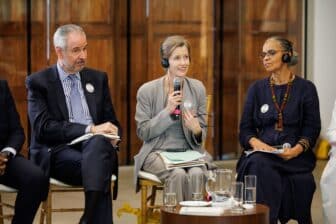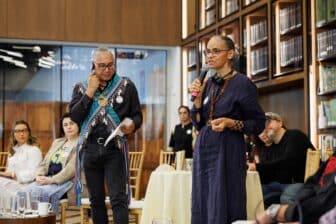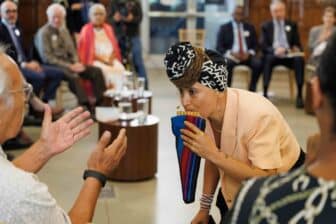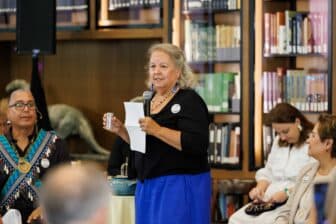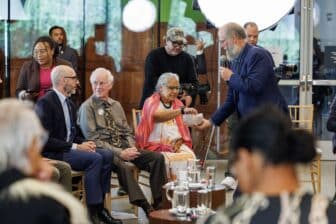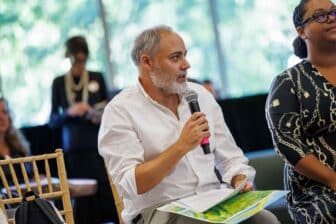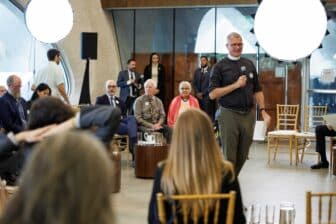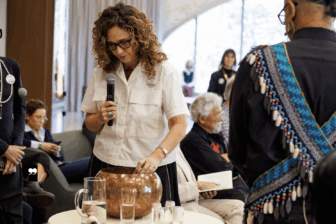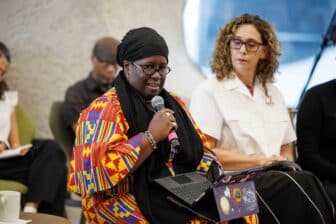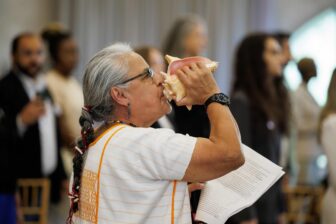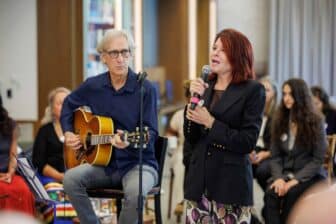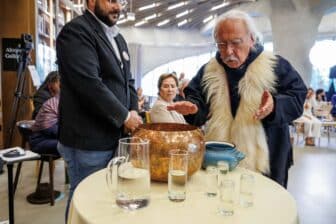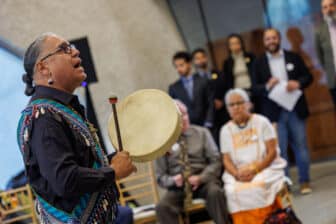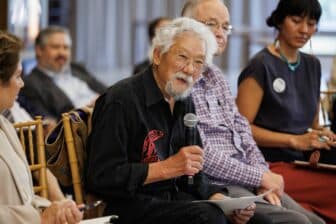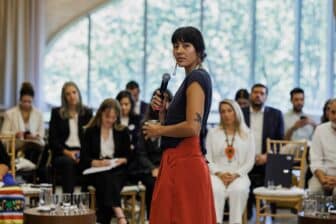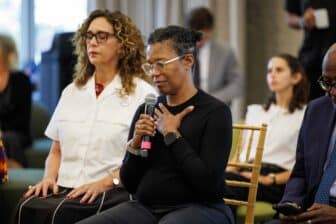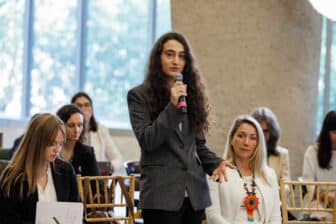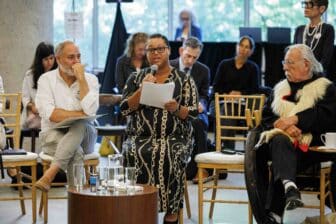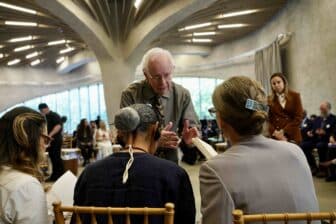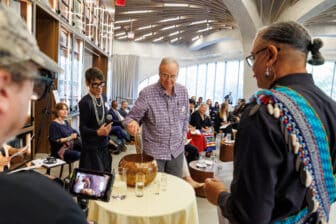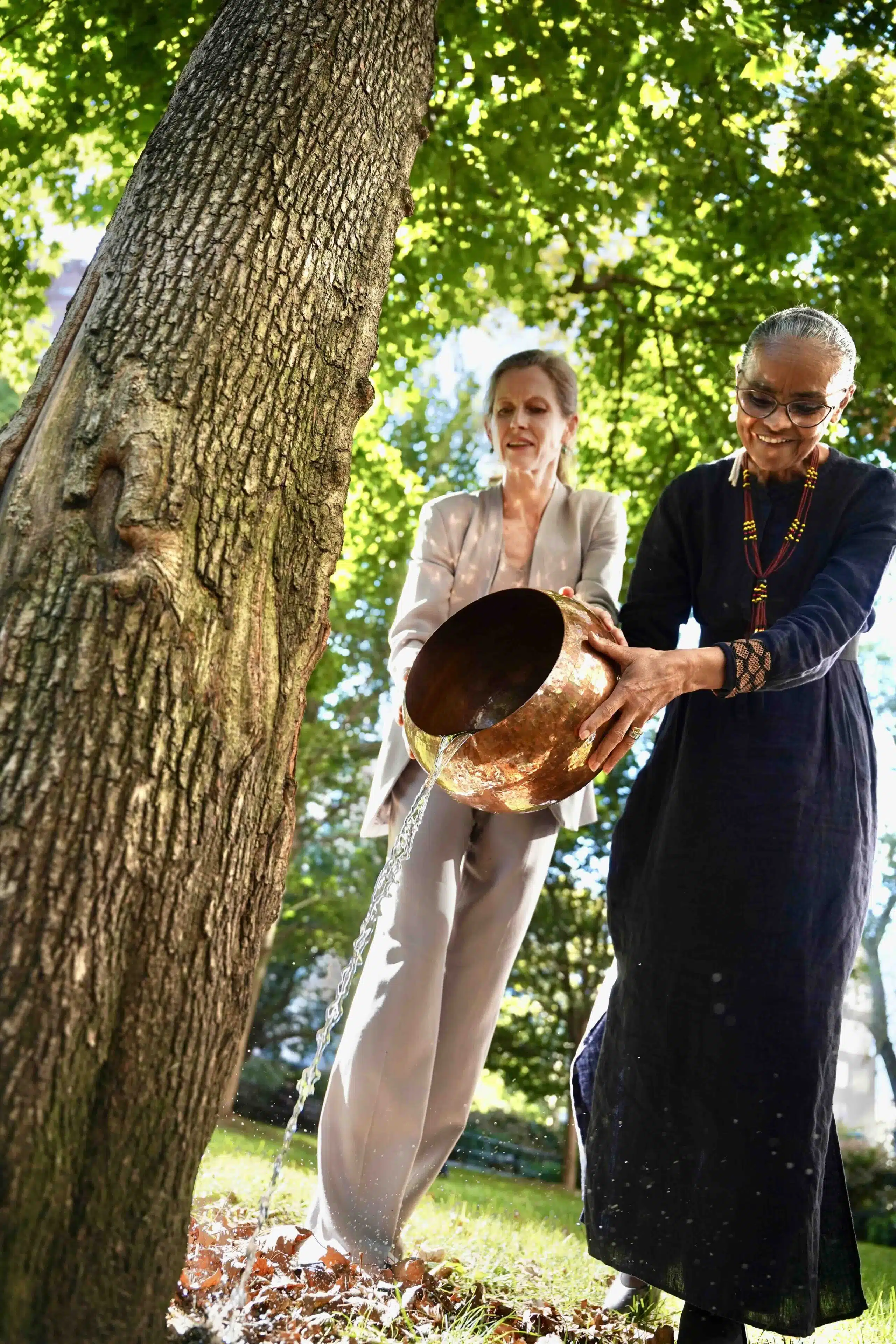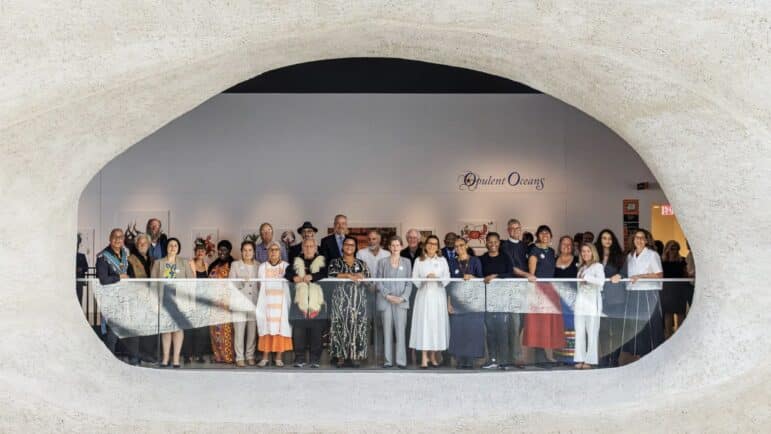
Toward a Spiritual Awakening: The North America Global Ethical Stocktake
“Our survival depends on a spiritual transformation, as much as a technical revolution.”
SUNY Distinguished Teaching Professor and Potawatomi writer and scientist Robin Wall Kimmerer gave this advice during the North America Dialogue of the Global Ethical Stocktake on September 19, 2025, at the American Museum of Natural History in New York City. In the lead-up to the annual UN climate conference (COP30), where countries negotiate actions and commitments to address climate change, UN Secretary-General António Guterres and Brazilian President Luiz Inácio Lula da Silva launched the Global Ethical Stocktake (GES) under the leadership of Brazil’s Minister of Environment and Climate Change Marina Silva.
Building on the Paris Agreement’s “Global Stocktake,” the GES assesses collective progress toward climate action, asking not only how far the world has come in reducing emissions, but how our choices can be rooted in justice, reciprocity and respect for life. Framed as part of a global mutirão—a term inherited from Brazilian Indigenous Peoples, referring to a community coming together to work on a shared task—the GES invites a range of perspectives into dialogue on the ethical foundations of climate action. By hosting formal Regional Dialogues on each continent and extending an invitation for broad-based Self-Organized Dialogues, the GES “aims to complement technical assessments with reflections on the ethical dimensions of climate negotiations.”
Background
CEE Executive Director Karenna Gore co-led the North America Dialogue alongside Minister Silva. This sixth and final Regional Dialogue gathered scientists, Indigenous leaders, diplomats, faith leaders, scholars, artists and activists from across the U.S., Canada, Mexico, Bermuda and Greenland to give their perspectives directly to the COP30 leadership.
Each participant offered a brief intervention (e.g., a speech, a song, a poem), reflecting on five guiding questions:
- Why do we so often deny or ignore what science and traditional knowledge say about the climate crisis and share or tolerate misinformation, even knowing lives are at risk?
- Why do we continue with production and consumption models that harm the most vulnerable and are not aligned with the 1.5ºC mission?
- What can we do to ensure that rich countries, major producers, and consumers of fossil fuels accelerate their transitions and contribute financing for these measures in the most vulnerable countries?
- What traditions, histories, or practices (cultural, spiritual) from your community teach us to live in greater harmony with nature?
- Considering that we need to guarantee diversity in the collective, how can we mobilize more people, leaders, corporations, companies, and nations to support just and ethical changes in combating the climate crisis? What ideas and values could inspire us in this mission?
Our survival depends on a spiritual transformation, as much as a technical revolution.
Robin Wall Kimmerer
Opening
The Dialogue opened in ceremony. Kasike Roberto Múkaro Borrero of the Guainía Taíno Tribe, the event’s facilitator, welcomed participants with a song honoring the winds in hurricane season. He was followed by Sophia Powless—a climate educator, artist, and activist from the Onondaga Nation Wolf Clan—who offered the Haudenosaunee Thanksgiving Address in the traditional way of some Indigenous Peoples of this region, uniting the room in respectful awareness of the many aspects of nature with which we are interrelated, including flora, fauna, waters, winds and sunlight.
Gore framed the purpose of the gathering. She called for an ethical approach to the accelerating climate crisis, noting that “to invoke and marshal [an ethical response], it takes a careful shift in approach—it takes intention and attention.” She emphasized the diversity of experiences captured within the room, and by extension, the region, noting how this shapes our call to action. She observed:
"[Some in North America] must acknowledge an enormous responsibility they carry for the burden that has been placed on others, in terms of the history of extraction, emissions, and domination. But within this region are also the voices of those who have borne the brunt of the mistakes and injustices of the way the dominant system took shape here. They have long carried calls and vision that are powerful for the world to hear."
Minister Silva explained that the GES was born from the conviction that ethics must become the foundation of the climate debate—an imperative made all the more urgent in a world marked by war, genocide and the triple planetary crises (climate change, biodiversity loss and pollution). She underscored integrating diverse knowledge systems, noting that she always speaks of “sciences” in the plural, and that Indigenous and local knowledge systems must be central to the GES process. Silva called for unwavering commitment to deliver on the Paris Agreement’s target to limit warming to 1.5°C, to mobilize climate finance for loss and damage, and to accelerate the transition to renewable energy and efficiency in a just, inclusive manner, ending reliance on fossil fuels.
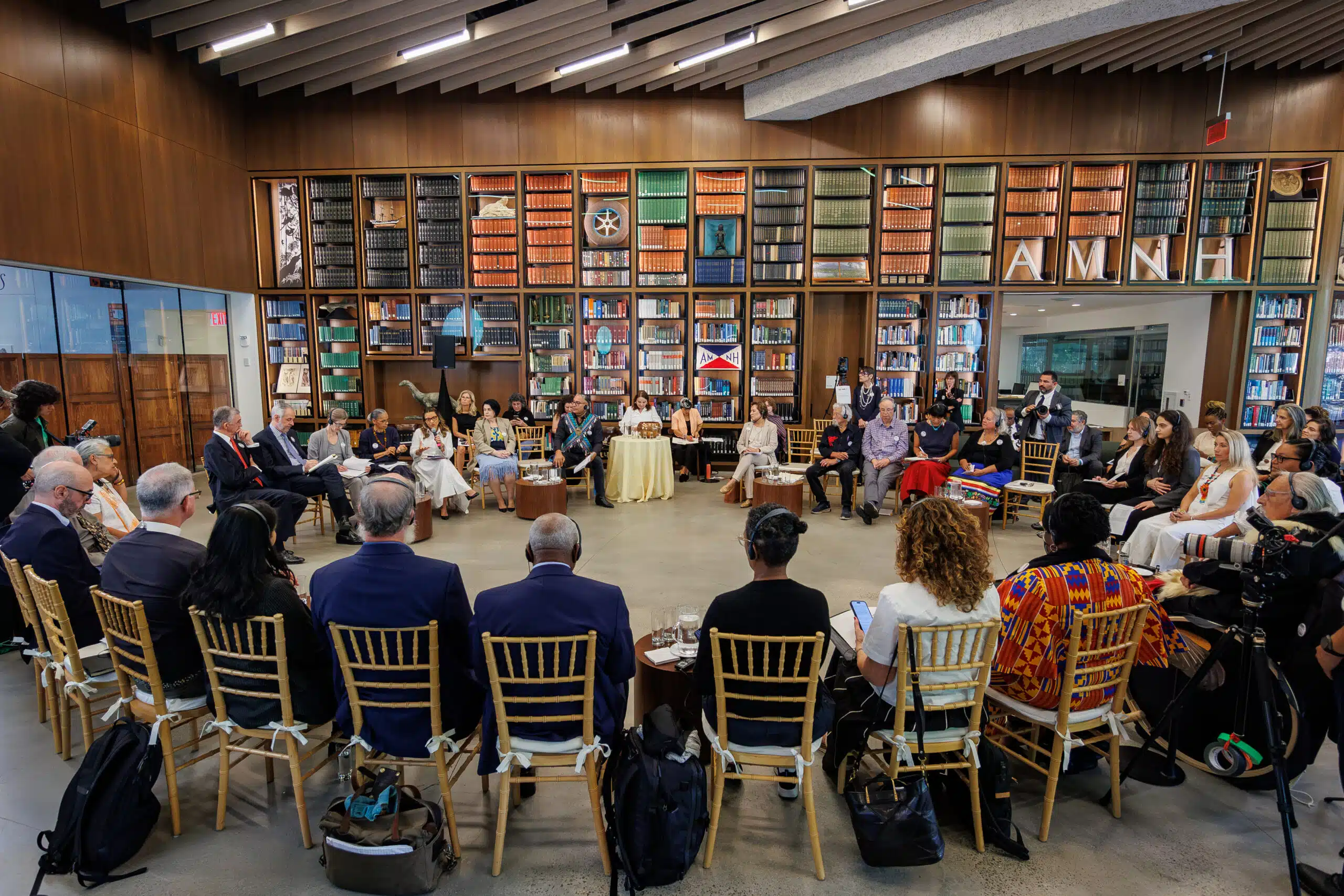
Art and Ceremony
Moments of art and ritual shaped the dialogue, adding emotional depth. Singer-songwriter Rosanne Cash performed a reimagined version of Woody Guthrie’s “This Land is Your Land”—recast as “We Belong to this Land”—followed by “What a Wonderful World.” At the Dialogue’s culmination, poet Alixa García, gracefully weaved the dialogue’s themes into a poem that brought together science, action, memory and spirit into one unified message.
Throughout the gathering, participants poured water, in many cases brought from their place of origin, into a shared vessel—a dynamic and living symbol of the collective spirit at the Dialogue. This amalgamation of North American waters came to represent the watersheds’ role in linking communities and ecosystems. Minister Silva reflected on a teaching from her Christian faith, recalling the words of Genesis 1:2: “the Spirit of God moved over the face of the waters.” Water, she said, is eternal—“it is a mystery, present with God and with darkness at the beginning of time.”
Why should our survival depend on our ability to endure? We need national and global policies that address the root causes of inequality and environmental degradation, not just policies that praise us for surviving them.
Noelle Young
Participant Interventions
1. Fossil Fuels
Fossil fuels were a central theme. In her opening remarks, Minister Silva called for a rapid shift away from a fossil-fuelled world, with many participants reiterating this imperative. Dr. Tzeporah Berman—international program director at Stand.earth and chair of the Fossil Fuel Non-Proliferation Treaty Initiative—criticized climate policies that avoid confronting fossil fuel production, describing this as “cutting with only half of the scissors.”
Both Berman and Jamie Margolin—founder of the youth climate movement Zero Hour—highlighted the $7 trillion in yearly global fossil fuel subsidies that distort the market, undercut the legitimacy of climate efforts, and delay action towards a fully renewable and safe future. A Fossil Fuel Non-Proliferation Treaty, already endorsed by 17 nations, is one mechanism for achieving the phase-out of polluting energy sources. In this same spirit, Dr. David Suzuki—a geneticist, science broadcaster and longtime environmental advocate—highlighted the many tendrils of fossil fuel industry influence, calling to bar lobbyists from UN climate negotiations.
Finally, Noelle Young—a Bermudian-Canadian sustainability solutionist and climate justice advocate—explained how the notion of resilience has been hijacked. She described how, rather than feeling like a virtue, resilience has become a trap, “suggesting that enduring hardship is our only option.” “Why should our survival depend on our ability to endure?” she asked. “We need national and global policies that address the root causes of inequality and environmental degradation, not just policies that praise us for surviving them.”
This lack of policymaking clarity has allowed the multilateral climate negotiations to dance around the main contributor to climate change: fossil fuels. COP26 in Glasgow in 2021 saw the first decision text that explicitly mentioned fossil fuels, calling for “the phasedown of unabated coal power and phase-out of inefficient fossil fuel subsidies.” It wasn’t until COP28 in Dubai in 2023—31 years after the UN Framework Convention on Climate Change (UNFCCC), the text guiding COPs, was signed—that language called for “a transitioning away from” fossil fuels, though this still fell short of calling for a full phaseout.
2. Storytelling
Participants emphasized the power of narrative to mobilize climate action. Dr. Kimmerer insisted that, despite all our technological, political and financial tools, humanity will not act without “a compelling story, a story that inspires change, a story that connects us to something greater than our narrow short-term self interests.” She urged policymakers and COP leadership to invest in cultural transformation and stories that value planet over profits, bridge science and spirit, and “help us remember our fundamental kinship with the Earth.”
For Reverend Fletcher Harper, executive director of GreenFaith, a narrative shift is essential in galvanizing cultural and political action on climate. He implored, “Can we stop believing that tightly controlled rationality will be the initiating and driving force behind the change that we need, and instead, together, continually commit to expressing things that are deeper and more beautiful?”
"Can we stop believing that tightly controlled rationality will be the initiating and driving force behind the change that we need, and instead, together, continually commit to expressing things that are deeper and more beautiful?"
3. Expanding and Strengthening Rights
Angakkorsuaq—an Eskimo-Kalaallit shaman, traditional healer, and storyteller from Greenland—spoke urgently about the ongoing struggle for recognition for Indigenous Peoples. “We have a responsibility to each other, and to the Earth. We all live on the same Earth. We are all humans—citizens. But Indigenous People are still not seen as equals.”
Margolin drew attention to the dangers that frontline Indigenous environmental defenders face, referencing death threats against the Waorani people of Ecuador. For Indigenous land defenders, resisting colonization and extractive capitalism comes with deadly risks.
The conversation elevated the growing movement to recognize the legal rights of Nature. Yenny Vega Cárdenas—lawyer and co-founder of the Observatoire international des droits de la nature (OIDN)—questioned the common worldview that treats Mother Earth as an object to be exploited, rather than as a living subject deserving of recognition, respect and gratitude. She highlighted two rivers in Canada: the Magpie, which was the first Canadian river to be granted legal personhood, and the Saint Lawrence, where advocates are pushing for similar legal status. Cárdenas emphasized the power of bottom-up, especially Indigenous, leadership in the movement for legal recognition of rivers, forests, animals and ecosystems as living beings who deserve the protections of personhood.
We have a responsibility to each other, and to the Earth. We all live on the same Earth. We are all humans—citizens. But Indigenous People are still not seen as equals.
Uncle Angaangaq Angakkorsuaq
4. Beyond GDP
Participants called for rethinking progress itself, stressing the urgent need to move beyond GDP as a measure of societal success. Dr. Enrique Leff—a sociologist, humanist philosopher and leading author—condemned the “techno-economic regime,” which has fueled the world’s ecological crisis. He argued that the discourse of sustainable development severed our relationship with the natural world, creating a reality in which “air and water, territories and livelihoods, were seized by the economic process [with] governments [pursuing] gross national product as their supreme goal through policies that devastate nature.”
Gus Speth—an environmental lawyer, former professor, co-founder of the Natural Resources Defense Council and founder of the World Resources Institute—called for system change in reciting his poem “New Consciousness”:
The deep problems are
avarice, arrogance and apathy,
dominant values badly astray.
What we need is not more analysis
but a spiritual awakening to a new consciousness.
5. Responsibility
Responsibility is another key thread. Dr. Robert Bullard—a Texas Southern University professor and a trailblazer in the environmental justice movement—noted that “climate change is also about vulnerability, and it’s also about responsibility. Those who have contributed least to the problem are feeling the pain first, worst and longest.” He uplifted the 17 “Principles of Environmental Justice” from the First National People of Color Environmental Leadership Summit in Washington, D.C., in 1991, and recalled how they were present and integrated into the historic Earth Summit in Rio in 1992.
Powless expanded the conversation on historical inequities by sharing a perspective rooted in intergenerational justice. She encouraged people to “embrace the Seventh Generation Principle,” which asks us to consider how our actions will impact future generations.
Dr. Suzuki reminded those gathered of humanity’s origins. “We were nomadic hunter-gatherers, one strand in a web of relationships with all other animals and plants, with air, water, soil and sunlight,” he said. “In ceremony, we thanked Nature for her gifts and acknowledged our responsibility to act in a good way to ensure her continued health.” Several participants echoed this sense that the erosion of respect and connection to Nature lies at the heart of today’s crisis. Responsibility must guide our response.
Recommendations
In addition to these themes, the COP30 GES team synthesized contributions from participant interventions into five core recommendations:
- Advance Ethical Systems Change that redefines how we measure and pursue climate progress, moves beyond GDP, reimagines knowledge and food systems, and centers climate justice. A first step is to recognize burgeoning efforts to guarantee the legal rights of nature.
- Integrate Diverse Knowledges: Consider both modern science and traditional, Indigenous and spiritual knowledge in decision-making during and after COP30. Move beyond the unrelenting insistence upon data as the sole path to truth, recognizing diverse knowledges as part of a global ethical framework, capable of inspiring peace, reconciliation and resilience between peoples and nature.
- Build a Just and Equitable Transition: Plan and implement the end of fossil fuel dependence in a just and inclusive manner, eliminate the participation of fossil fuel lobbyists, and develop a fossil fuel elimination process and commitment, such as the Fossil Fuel Non-Proliferation Treaty, complementary to the Paris Agreement. Also, ensure access to adequate resources, including finance.
- Prioritize Inclusive Participation and Protection: Ensure that Indigenous Peoples, youth, women and local communities have decision-making power in climate negotiations. Protect environmental defenders from violence and ensure they have legal protections.
- Adopt a Narrative Shift: Dense reports with technical language do not move people to action and often pose accessibility barriers. COP negotiators should embrace more accessible and compelling communication, moving beyond dense reports and technical jargon to storytelling that inspires action. Explore new ways to mobilize not just the leaders of nations, but also people and communities worldwide, through art, ceremony and other pathways.
What's Next?
On September 24, during the high-level week of the UN General Assembly, regional co-leaders and Minister Silva delivered the summaries of all six Regional Dialogues to President Lula da Silva. A full and public report will follow, with recommendations for COP negotiators. The GES will also host a dedicated pavilion in the Blue Zone at COP30, showcasing the outcomes of the regional dialogues, including photos, videos and a co-created collage art piece.
In addition to offerings during the North America Dialogue, there were countless unrecorded and informal discussions on the ethical imperatives for climate action in the lead-up to and aftermath of the event. The official findings are only the beginning of the deep and ongoing effort to inspire ethically-rooted climate action, as the GES leadership’s push for Self-Organized contributions reflects. Select submissions from these Self-Organized Dialogues will also be displayed in the GES pavilion.
As Minister Silva emphasized, the GES seeks to establish a new benchmark for how the world addresses the climate emergency. The North American gathering of the Global Ethical Stocktake hence served as both witness and contribution to this larger mutirão: the global effort to root climate action in ethics, justice, reciprocity and respect for life.
The poet Alixa García captured the day:
Remember to remember,
in these times of genocide and ecological suicide,
we must sacrifice our conveniences for the resacralization of life.
So, remember to remember,
if you’re a change maker,
expect to change the most.
View more insights and ideas that emerged from the official North America Dialogue and Self-Organized Dialogues in our new Voices from the GES digital platform.
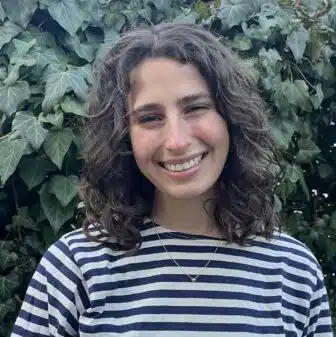
Clara Chavez-Ives
Clara Chavez-Ives is a research associate at the Center for Earth Ethics.
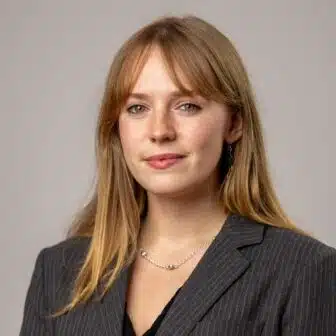
Rosie Semlyen
Rosie Semlyen is a research and policy associate at Center for Earth Ethics.

